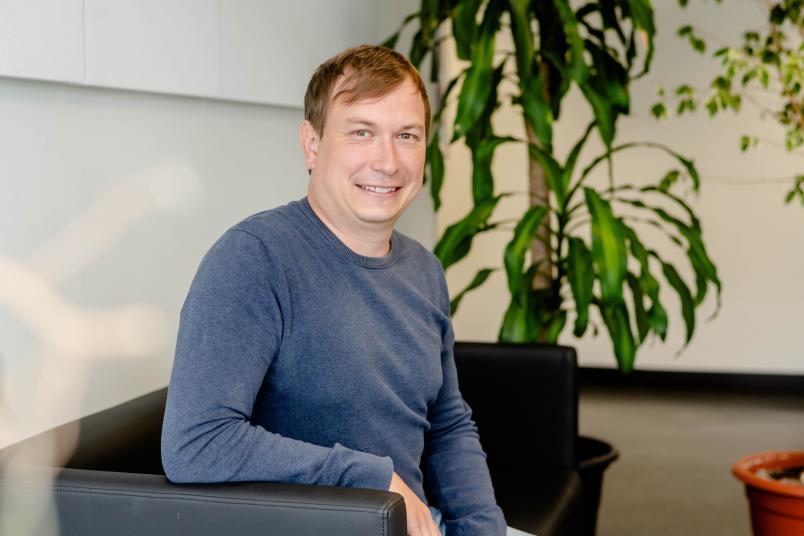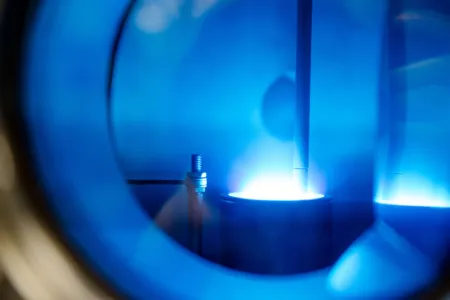
Research data management
“Most importantly, you need the ability to communicate”
Andreas Schramm helps researchers to make their data usable in the long term. This takes a lot of convincing.
Dr. Schramm, your job title is data steward. What does that actually mean?
Initially, I didn’t know what to make of the term either. At the end of the day, I’m a data steward who helps researchers to handle their data in accordance with good scientific practice. The point is to ensure that future generations will also be able to use the data. To this end, the data must be documented and stored in such a way that it can be easily traced once it’s been generated.
FAIR principles for handling data
Which qualities should a data steward have?
Most importantly, you need the ability to communicate and connect with people easily. I work with lots of different teams and must be able to tune in to different people. A good dose of persistence helps me to ensure that researchers remain focused on research data management. You also need a certain level of frustration tolerance and patience.

You mustn’t be disappointed if a solution isn’t immediately embraced the way you thought it would be.
Why is that?
Researchers struggle to efficiently fit research data management into their daily routine. First and foremost, they want to do research and their aspiration is to publish the results of their research. This leaves little time for sustainable research data management according to the FAIR principles. Therefore, the issue is not at the top of their agenda. You mustn’t be disappointed if a solution isn’t immediately embraced the way you thought it would be.
What can be done about it?
It’s important to remain patient and helpful and to keep pointing out the technological options that are in place. I think something needs to change fundamentally going forward. It’s not just scientific publications that should be valued, but also the way to get there – this includes making research data as well as research software available in the long term. We also have to try to continuously optimize existing systems and software for research data management to reduce the effort required to use them. At Ruhr University Bochum, a dedicated tool that is available to all researchers has been developed in close collaboration between the Research Data Service Team and the Collaborative Research Center for Extinction Learning.
What do you enjoy most about research data management?
Working with the researchers! This presents new challenges every day. When you design something, no matter if it’s a data structure or a software solution, and then it works and is adopted by the users, that feels really good, of course. I also enjoy that I still get to experience research close up. I was a postdoctoral researcher at the Chair of Thermal Turbomachines and Aeroengines and am now employed at IT.SERVICES. Even while I was working as a researcher, I advised PhD students on how to handle data in a sustainable way and was often jointly responsible for the IT side of projects. In my current role, I’m getting to know the entire spectrum of research at Ruhr University Bochum.
Do you still maintain links to your previous field of work?
As data steward, I’m currently responsible for the two collaborative research centers “Bulk Reaction” and “Cosmic Interacting Matters” The Transregio “Bulk Reaction” focuses on, among other things, mechanical engineering and is thus closely related to my former field of research. The collaborative research center “Cosmic Interacting Matters” in the fields of physics and astronomy combines the subfields of astrophysics, plasma physics, astroparticle physics and particle physics. There’s still a lot left for me to discover there.
Can researchers from other areas also reach out to you if they have questions about research data management?
The first point of contact for questions is the Research Data Services Team of Ruhr University Bochum. We then discuss with the team who can best handle which concerns. Therefore, I sometimes deal with other research disciplines in addition to the two collaborative research centers, but the latter are my main focus.
Do you also communicate with other data stewards in addition to the Research Data Services team?
We do communicate with some other parties who are involved in research data management at Ruhr University Bochum. In the long term, we’d like to establish a research data management network at the University to connect stakeholders and interested parties and facilitate exchange. To this end, we intend to address data stewards, science managers in Clusters of Excellence, Collaborative Research Centers, Research Training Groups, and institutes, as well as other researchers. If you’re interested in joining us, please feel free to sign up for the mailing list.

In the future, we’d like to expand our network even further, because ultimately we all face similar challenges.
In addition to Ruhr University Bochum, we routinely communicate with our partners within the University Alliance Ruhr. In the future, we’d like to expand our network even further, because ultimately we all face similar challenges.
